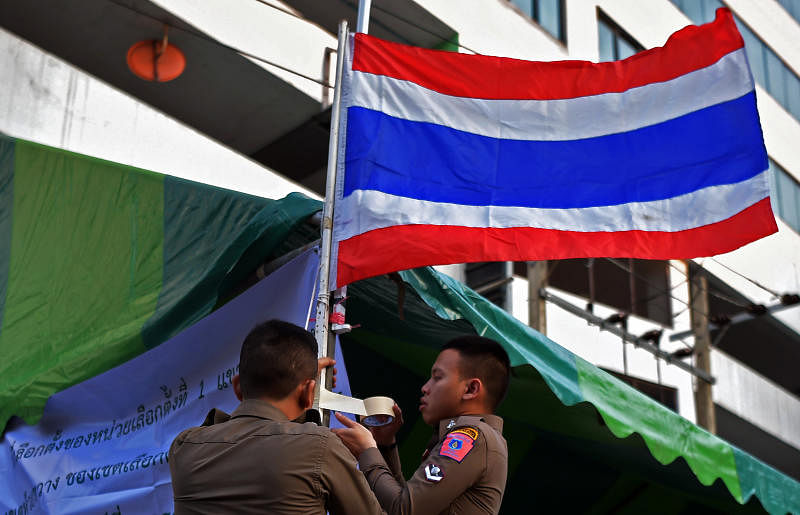Thailand holds first censure debate in seven years
Sign up now: Get insights on Asia's fast-moving developments

The debate is expected to last at least three days and will focus on controversial issues, past and present.
ST PHOTO: KUA CHEE SIONG
BANGKOK - For the first time since the 2014 military coup, Thailand is holding a censure debate and no-confidence motion, with top government officials, including former junta leader Prayut Chan-o-cha, the Prime Minister, being put under the spotlight.
The debate, which started on Monday (Feb 24) afternoon, is expected to last at least three days and will focus on controversial issues, past and present.
It will go as far back as the coup and corruption allegations made against the military regime, which was in power until the middle of last year.
The more current issues include the sluggish economy, handling of the coronavirus outbreak and the PM2.5 pollution since last year, which has often resulted in the Air Quality Index (AQI) staying at the unhealthy level.
The debate will be wrapped up with a no-confidence motion later this week.
Thailand's economy grew by only 2.4 per cent in 2019, the lowest in five years owing largely to the trade war between the United States and China as well as the strong Thai baht.
With the Covid-19 outbreak, Thailand is expecting it to reduce its GDP growth to 2 per cent in the first quarter of 2020.
But since last year, the government has rolled out several stimulus measures.
"Only one per cent has enjoyed stability, prosperity and sustainability. This is the economy of the capitalists, by the capitalists, for the capitalists," said Mr Pita Limjaroenrat, referring to the Prayut administration's slogan.
Mr Pita is the leader of the remaining MPs of Future Forward, the opposition's second biggest party before it was disbanded by the Constitutional Court on Friday (Feb 21).
"Government stimulus measures like 'Eat, Shop, Spend' are like giving paracetamol to cancer patients," he added.
Among the six top officials being targeted, Deputy Agriculture Minister Thammanat Prompow, Palang Pracharath's broker with other coalition parties, is perceived as the weakest link.
The reason: his four-year conviction in Australia for trafficking 3.2kg of heroin in the 1990s, said Assistant Professor Wanwichit Boonprong, a political scientist at Rangsit University.
Deputy Prime Minister Prawit Wongsuwan, on the other hand, will be grilled mainly for the army's purchasing spree of weaponry when he was the defence minister and his unusual wealth. He owns about two dozen luxury watches worth US$1.24 million (S$1.74 million) that were not declared.
But the main focus has been on Mr Prayut, who led the 2014 coup and whose five-year undemocratic rule was plagued by allegations of human rights violations such as military detentions and several sedition and computer crime charges handed to dissidents.
He was also accused of poor treatment of journalists over the years.
Defending himself, Mr Prayut said: "I have never offended anyone. Even on social media, I have never sought to arrest anyone. There has only been mercy. As for the accusation that I have been rude to the press, I have never done that."
The debate is taking place amid an opposition weakened by Friday's dissolution of Future Forward, and a 10-year ban from politics for all its executives.
The remaining 64 MPs can take part in the debate as independent lawmakers but will need to seek membership in other parties before their MP status expires in two months.
On Sunday, one of the banned MPs, former party spokesman Pannika Wanich held a talk that she referred to as "censure debate outside Parliament".
She accused Mr Prayut and the Thai authorities of being involved in a cover-up of Malaysia's 1MDB scandal, calling his tie with former Malaysian prime minister Najib Razak "a dark alliance".
On Monday (Feb 24), government spokesman Narumon Pinyosinwat denied the allegation, saying a lawsuit is being prepared against her.
The government coalition has been enjoying a comfortable majority of 263 seats against the opposition's 224 in the 500-member Lower House. One more will be added following Sunday's by-election victory for the pro-military Palang Pracharath Party, the powerhouse leading the coalition.
Against this backdrop, the no -onfidence motion will not pose a serious threat to the government coalition, analysts said.
"The current mechanism does not allow room for prime ministerial candidates other than Mr Prayut," said Prof Wanwichit, referencing the rubber-stamp Senate that voted Mr Prayut in for his second term last year.
"But the motion could affect internal ties in the coalition and lead to a Cabinet shake-up," he added.


